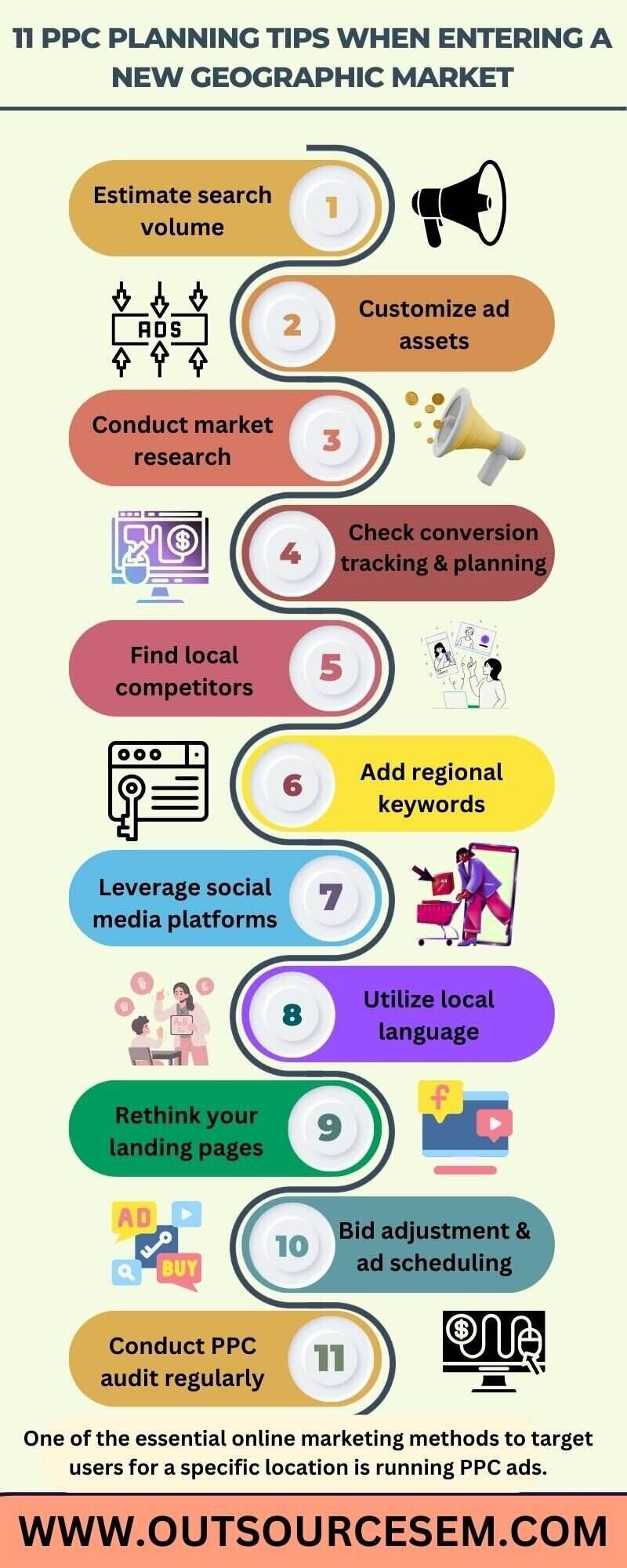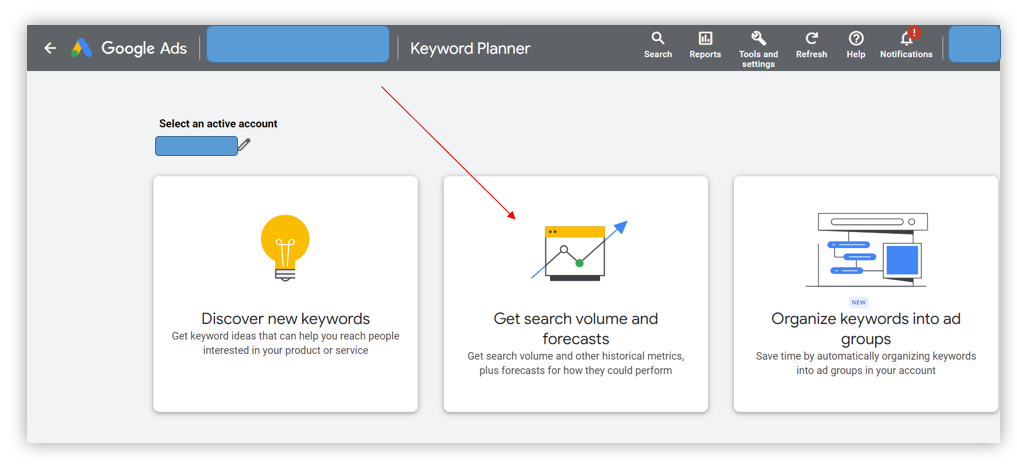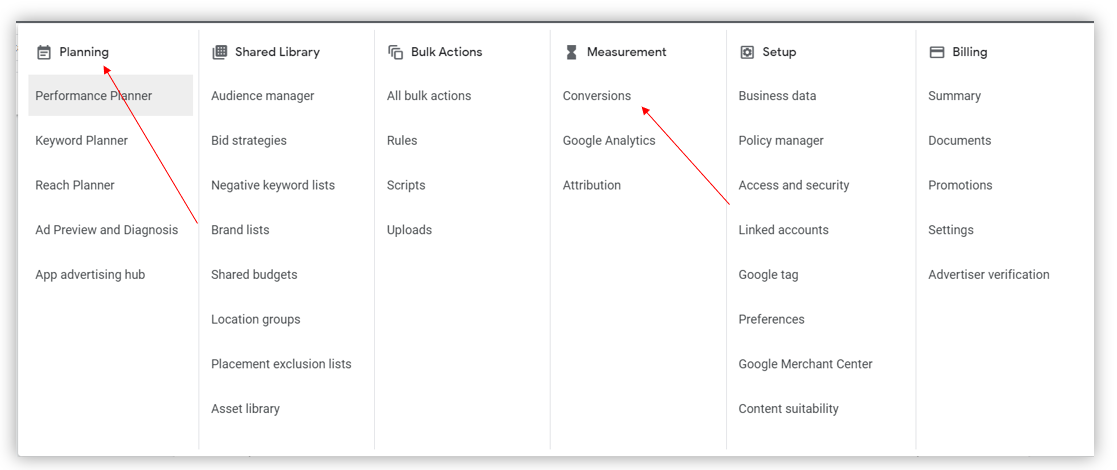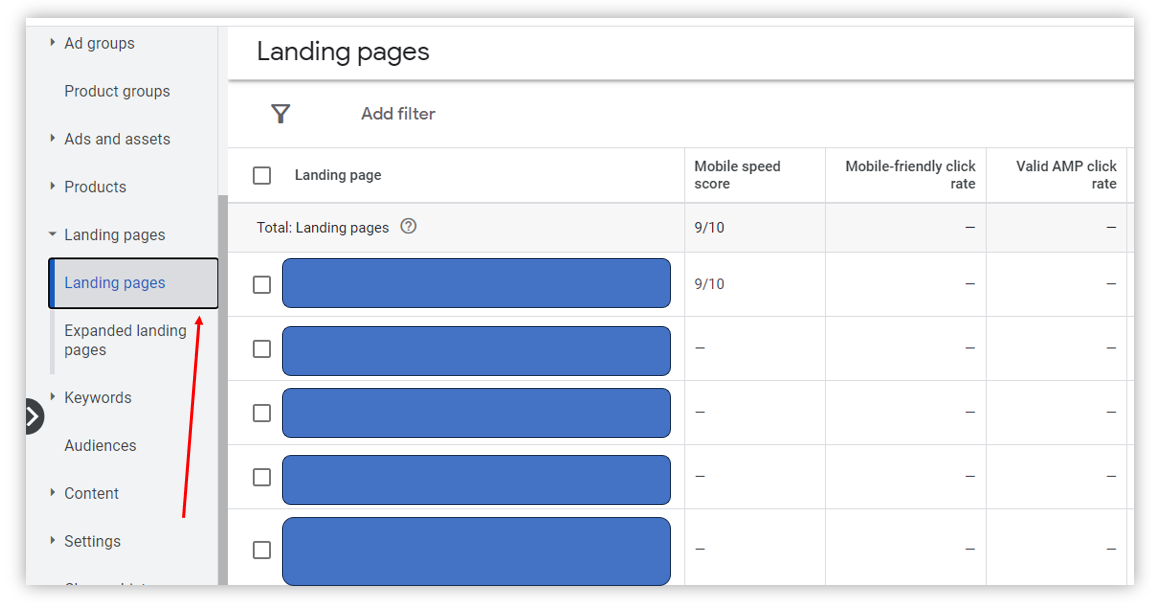When embarking on the journey of expanding your business to a new geographic location, it's imperative to have a well-crafted and comprehensive marketing strategy in place. This is true regardless of whether you are an established brand or still building brand awareness within your industry. It's essential to recognize that this applies to all types of campaigns, including PPC campaigns, SEO campaigns, e-commerce PPC campaigns, etc. One of the essential online marketing methods to target users for a specific location is running PPC ads. Running pay-per-click ads helps increase impression share, generate leads, etc. It requires careful planning and a solid strategy to achieve the desired advertising return on investment (ROI). In this blog, we'll delve into the essential PPC planning tips to help you effectively reach your target audience in a new geographic location.
Essential PPC planning tips you need to focus on when entering a new geographic market are mentioned below.

a. Estimate search volume - When you start running PPC ads at a new geographic location, the essential point that you need to focus on is focusing on estimating search volume. When you conduct keyword research for your ad format, like video ads, search ads, mobile ads, display ads, etc., the first point to focus on is choosing the keywords. When you choose the relevant keywords, it is essential to estimate search volume. Selecting the relevant keywords based on search volume is vital so that your ad rank & position on the SERPs increases, ultimately increasing impression share, traffic to the landing page and, finally, boosting conversion rate.
Different businesses have different target goals and so the keywords for different companies vary. When you conduct keyword research, there may also be low search volume keywords that would help you in lead generation and drive quality website traffic to the landing page. As in search engine optimization, you have small business SEO, e-commerce SEO, etc. and the keywords for these businesses vary, so it is essential to conduct SEO keyword research to determine which keywords to choose for the SEO campaigns. Similarly, in your paid search strategy, you must choose high-traffic relevant keywords that matter the most to your business. In your paid advertising strategy, there are different social media advertising platforms that you may be running paid ads like Facebook Ads, LinkedIn Ads, Instagram Ads, YouTube Ads, etc. and so it is essential to choose keywords that match the users' search intent to maximize the advertising ROI.

b. Customize ad assets - The next essential point to focus on when entering a new geographic location to run PPC ads is customizing ad assets. When you get started with running paid ads, it is essential to focus on adding ad assets that ease users' buying journey. When you start running paid ad campaigns for specific locations, it is vital to focus on optimizing the ad assets that enhance the performance of PPC campaigns for the specific location. Whether you are an established brand or looking to build brand awareness, it is essential to customize ad assets.
While there are chances of your ads performing well, customizing the ad assets as per the user buying activities is essential to ensure the clicks on your ad increase. You may take learnings from existing mistakes as to what ad assets perform best; when you consider customizing your ad and tailoring your ad copy specific to the region, it helps to generate clicks on the ad.
As in local SEO, you focus on implementing the essential title tags, meta descriptions, etc., to build brand awareness for local users. Similarly, for your local service ads, you need to focus on optimizing the ad assets that entice the users to click on the ad. You can also consider adding ad extensions that lure the target audience into taking the desired action on the landing page.

c. Conduct market research - The next essential point that you need to focus on is to conduct market research. When you focus on running paid ad campaigns like Google Ads, Microsoft Ads, etc., you need to conduct market research and analyze what the users are searching for in the online world. This gives you a clear idea of what you need to focus on to ensure that the target audience clicks on the ad.
Once you focus on ad personalization, the chances of the users clicking on the ad are enhanced. As PPC ads involve money to be paid to search engines or online platforms for every click received on the ad, it is essential to ensure that your ad budget does not get wasted on irrelevant clicks. To do this, as you focus on competition analysis to determine what the users are targeting, you need to conduct market research to determine the necessary changes that need to be implemented. With market research, you have an idea of what ad campaigns need to be run for a particular geographic location to drive users' interest in your paid ads.
Whether you are running paid ad campaigns on the search engines like Google or Microsoft, etc., or running paid ad campaigns on social media platforms like Facebook Ads, LinkedIn Ads, Instagram Ads, etc., conducting market research is essential to increase users interest on your ads. As you perform social media audit for your paid ad campaigns, SEO audit for your local SEO business, enterprise SEO, video SEO, small business SEO, SEO analytics, etc., to determine how the SEO metrics are performing for these locations. In the same way, you can perform a PPC audit to determine the necessary changes that highlight the necessary changes that need to be done.
d. Check conversion tracking and planning - The next essential point you need to focus on when entering a new geographic market in your PPC advertising strategy is checking conversion tracking and planning. In your PPC advertising strategy, as you focus on Google Ads optimization, LinkedIn Ads optimization, Facebook Ads optimization, LinkedIn Ads optimization, etc. similarly, you need to track the conversions. As the PPC ads are paid, when entering a new geographic location, you need to focus on tracking the visitors that convert to customers. In your PPC search marketing strategy, you must have an idea of the users with high chances of taking the desired action and the ones that are just window shopping. There may also be users who do not convert due to one reason or another. For such users, you can consider running remarketing ad campaigns like Google Ads remarketing campaigns, Facebook Ads retargeting options, etc.
In your search engine optimization strategy, you focus on performing an SEO audit and preparing an SEO report to analyze how much time a user spends on the page, analyze the bounce rate, etc., and then work on strategies to optimize the performance of the SEO campaign. Similarly, in your PPC marketing strategy, you need to focus on conversion tracking to know which users take the desired action on the landing page. You can also have a PPC plan to focus on audience segmentation and target the users based on the search intent. This can be done by ad scheduling and using the proper keyword match type. By analyzing the user behavior, you can work on PPC planning and divide keywords into the exact match, phrase match and broad match. To get the maximum number of clicks, you focus on using the negative keywords that prevent your ads from appearing for irrelevant search queries and ensure that users with high chances of taking the desired action reach the landing page.
When running ads on social media platforms, you focus on optimizing the ad, like optimizing Facebook Ads, optimizing LinkedIn Ads, optimizing YouTube Ads, etc., to ensure that you receive the maximum number of clicks. In the same way, you need to focus on optimizing Google Ads and optimizing Microsoft Ads and performing competitor analysis is essential for this. It helps you to have an idea of the keywords or search terms that users enter when searching for the desired results. You can then perform PPC keyword research and prepare a keyword list to determine the essential keywords that you need to target to achieve the desired results.

e. Find local competitors - When entering a new geographic location you need to be aware of the fact that there may be multiple competitors already present in the specific geographic location. So, it is essential to find your local competitors and make your plan & strategy accordingly.
When you have a clear idea of the local competitors, your paid ad campaigns yield the desired results. Whether you are running e-commerce SEO campaigns, e-commerce PPC campaigns, local SEO campaigns, etc., it is essential to focus on niche marketing to ensure that the users take the desired action. So, when you target users locally and optimize your ads accordingly, there are high chances of your ad position & ranking getting higher on the SERPs.
f. Add regional keywords - The next essential point that you need to focus on is adding regional keywords. Whether you are an established brand or looking to build your brand name, it is essential to add regional keywords. When you add regional keywords, you target local users as they enter the local keywords when looking for the desired products or services. It helps in building brand awareness locally and increasing website traffic.
g. Leverage social media platforms - When entering a new geographic location, you need to leverage social media platforms in your strategic marketing plan. In today’s digital marketing world, social media is becoming an engaging part of users' activities. So, you must ensure that you target the users on these platforms and increase users’ trust in your brand name. As of August 2023, there are nearly 4.9 billion social media users. This shows the importance of social media platforms globally. Including social media platforms in your advertising strategy ensures that your ad reach increases and more users see your ad.
h. Utilize local language - When targeting a new geographic location, the next essential PPC planning tip is to utilize local languages. The local languages are essential to target local users as they can easily get versed with the pay-per-click ad. Whether you are running Google Ads, Microsoft Ads, social media ads, etc., it is vital to focus on utilizing the local language for your PPC ads. It also engages users' interest in the ad and the chances of users clicking on the ad increases.
As in search engine optimization, you focus on local SEO and conduct SEO keyword research for local users; similarly, you need to conduct PPC keyword research for local users to target them to click on the ads. Though businesses with well-established brand names in the online marketing world do not face big issues in grabbing users' attention to choosing their business, small businesses need it. So, it is essential to focus on utilizing local language to ensure that the ad rank & position of these businesses increase, leading to generating leads, driving paid traffic to the landing and ultimately converting the visitors to customers.
i. Rethink your landing pages - The next essential point that you need to focus on is to rethink your landing pages. As you focus on targeting users to a new geographic location, you must rethink your landing pages. As you focus on ad personalization to ensure that the target users get the ad as they want to see it. Similarly, you need to optimize landing pages and personalize content that increases the chances of the users clicking on the ad. You need to ensure that you increase users' time spent on the page and navigate through different sections on the website so that the chances of the users taking the desired action on the landing page increase. You need to focus on content marketing and optimize content to increase the conversion rate.

j. Bid adjustment & ad scheduling - The next essential point that you need to focus on is working on bid adjustment and ad scheduling. Bid adjustment is one of the essential PPC metrics that you need to focus on to ensure that you have the maximum advertising ROI. When you work on bid adjustment, the cost-per-click of your paid ads lowers and you have quality traffic on the website. You can also focus on ad scheduling so that the target audience sees the ad at the desired time so that the chances of the users taking the desired action increase.

k. Conduct PPC audit regularly - The next essential point to focus on is to conduct a PPC audit so that you have a clear idea of how your paid ad campaigns are performing. It gives a holistic view of how your paid ads are performing. It highlights the performance of crucial competitive metrics that matter the most to your business. With the help of this audit, you can prepare a data-driven PPC report that gives you an idea of the necessary changes that need to be done to enhance the ad performance.
Conclusion
With the above-mentioned PPC planning tips, you can have an increased conversion rate for your ad campaigns. However, you need to ensure that you optimize Google Ads or Microsoft Ads regularly so that the performance of the paid ad campaigns increases. You need to target the local keywords and focus on audience targeting so that the relevant users click on the ad. It is also essential to focus on demographic targeting to create a sense of urgency among the target audience that lures them into taking the desired action on the landing page. If you find running a paid ad campaign a tough task to perform, you can get in touch with a digital marketing company with expertise in running mobile ads, video ads, display ads, etc., and help you achieve the desired advertising ROI for a specific geographic location. When you outsource PPC services to an offshore digital marketing company, you hire offshore PPC experts with experience in optimizing ads for different locations and help you achieve desired goals. By hiring our online marketing experts you can get advantage of our various services for your home business like lawyer PPC, flooring PPC, roofing PPC, HVAC PPC, small business PPC and many more. By availing these services you can enhance online visibility and thereafter the growth of your business.
References:
. 7 PPC planning tips when entering a new geographic market
. Geo-targeting: Local PPC strategy and actionable tips
